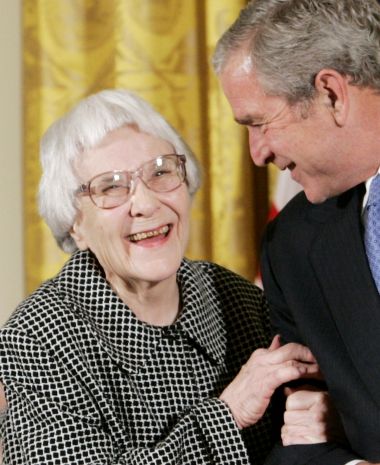Harper Lee to publish To Kill a Mockingbird sequel

The literary and theatrical worlds are celebrating the surprise announcement by author Harper Lee that she is to publish a sequel of her Pulitzer Prize-winning To Kill A Mockingbird this summer.
Mockingbird, the story of how racial prejudice and fear led to a terrible injustice in spite of the gifted advocacy of lawyer Atticus Finch, based loosely on Lee's own childhood and her father, has been beloved of adults and children since it was published in 1960.
Regents Park Open Air Theatre production of the play, based closely on the book, is currently touring to sell-out houses around the UK and opened this evening in Glasgow's Theatre Royal.
The sequel, Go Set a Watchman, is set 20 years after Mockingbird and features an adult Scout. Written before Mockingbird, Harper Lee believed the manuscript to have been lost.
Harper, the publishers, who will bring out the sequel in July, issued a statement quoting Harper Lee, aged 88. "In the mid-1950s, I completed a novel called 'Go Set a Watchman'," she said.
"It features the character known as Scout as an adult woman and I thought it a pretty decent effort. My editor, who was taken by the flashbacks to Scout's childhood, persuaded me to write a novel from the point of view of the young Scout. I was a first-time writer so I did as I was told."
The manuscript was found by her lawyer Tonja Carter.
To Kill A Mockingbird has sold more than 30 million copies.
In 1966, Harper Lee, who rarely makes any public comment about her masterpiece, decided to intervene after a school in Richmond, Virginia attempted to ban the book as immoral. In a letter, she emphasised the book's foundation in Christian ethics.
She wrote: "Surely it is plain to the simplest intelligence that To Kill a Mockingbird spells out in words of seldom more than two syllables a code of honor and conduct, Christian in its ethic, that is the heritage of all Southerners. To hear that the novel is 'immoral' has made me count the years between now and 1984, for I have yet to come across a better example of doublethink.'
Changes to the GCSE English Literature syllabus under Michael Gove mean that US books were put at risk of being excluded, and at least one exam board dropped Mockingbird from its syllabus after Gove's call for pupils to study more British books. Nearly 83,000 people have signed a change.org petition calling on the present Education Secretary Nicky Morgan to undo these changes.











